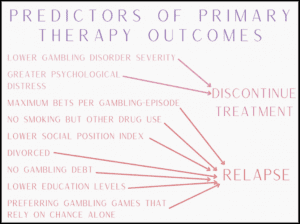The WAGER, Vol. 26(10)
Written By Taylor Lee
Read the original article on The Basis website Here.
Problem gambling occurs more frequently among men, but it is still present among women and is understudied in this population. Gambling Disorder (GD) refers to persistent and problematic gambling behavior leading to distress, and that causes financial, relationship, and psychological harm. The effectiveness of GD treatment has received limited attention in the scientific literature. Common factors that might influence treatment effectiveness include discontinuing treatment and relapse. This week, The WAGER reviews a study by Marta Baño and colleagues that examined the short-term therapy outcomes of group CBT among women with Gambling Disorder.
What were the research questions?
What is the short-term effectiveness of group standardized cognitive behavioral therapy (CBT) among women with GD? Also, what are the most important predictors of primary therapy outcomes (discontinuing treatment and relapse)?
What did the researchers do?
The researchers assigned 214 women seeking treatment for Gambling Disorder at the Pathological Gambling and Behavioral Addictions Unit at the Bellvitge University Hospital in Barcelona, Spain to a group CBT program. Participants attended weekly 90-minute sessions for 16 weeks and learned CBT strategies to recondition cognitive distortions and improve emotional regulation, with the ultimate goal of absolute and continued abstinence from all gambling behavior. These CBT strategies included education on vulnerability factors, ways to avoid possible triggers, and how to respond to urges with alternative healthier behaviors. The researchers used logistic regression, negative binomial regression, and survival analysis to assess predictors of discontinuing treatment and relapse.
What did they find?
During the course of treatment in the study, 90 women (42%) skipped three consecutive treatment sessions and 77 women (36%) had at least one relapse. Women with relatively less severe Gambling Disorder, and experiencing greater psychological distress, were more likely to discontinue treatment. On the other hand, relapse risk was higher among women with lower education levels, those without gambling-related debt, and divorced women. Drug use (other than smoking), placing more maximum bets per gambling-episode1, preferring gambling games that rely on chance alone such as bingo or slot machines2, and lower socioeconomic status were also associated with higher relapse rates during CBT (see Figure).

Figure. Statistically significant predictors of primary therapy outcomes—discontinuing treatment and relapses— among women in CBT treatment for Gambling Disorder (n = 214). Arrows indicate significant predictors of either discontinuing treatment or relapse. Click image to enlarge.
Why do these findings matter?
Learning more about female gambling behavior and identifying specific predictors of discontinuing treatment and relapse can help clinicians provide better GD treatment. For example, severe emotional distress may indicate a need for greater emphasis on emotional regulation techniques (e.g., through mindfulness meditation) or healthy coping mechanisms. CBT might also need to be adapted for those with lower education levels to be more engaging and comprehensible. These findings also demonstrate a clear need for future research on women with GD to understand their unique lived experiences.
Every study has limitations. What are the limitations of this study?
As a study with only female participants, the findings can not be generalized to men. Additionally, measures such as amount bet per gambling episode relied on self-reported data, in which participants may have over- or underestimated their actual gambling behavior.
For more information:
Do you think you or someone you know has a gambling problem? Visit the National Council on Problem Gambling for screening tools and resources.
________________
[1] In this context, “maximum bets per gambling-episode” refers to most bets placed during any single past gambling experience.
[2] As opposed to games like poker, which include both chance and skill.

